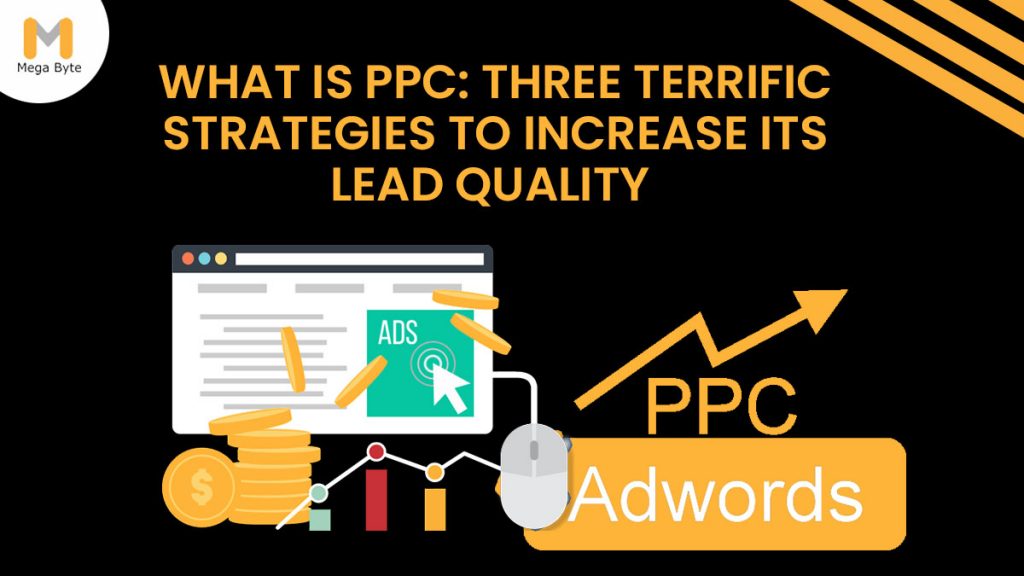Producing leads with Pay Per Click campaigns can be a daunting task. Moreover, trying to generate high-quality leads is even more challenging. But if you are new to this and do not have a clue of what we are talking about, then you might be thinking– “what is PPC?”- Aren’t we right? If so, no need to worry. Today we will talk about– What is PPC?: Three terrific strategies to increase its lead quality. Additionally, we will also talk about its meaning. All of your doubts will vanish for sure by the end of this article.
WHAT IS PPC
Pay-per-click follows the acronym PPC, which is an online digital marketing strategy. Many call it by the name of Google ads also. It uses specific terms and keywords that are typed in by the searcher into Google’s search space.
PPC is a paid digital marketing tool and gathers more business traffic, unlike the organic SEO. PPC campaign operates by the bidding strategy and brings your website more potential customers. Furthermore, it also provides you an insight into how much interaction your business is making. Investing in PPC is the quietest way to reach out to your customers and boost business sales.
We guess everything is clear about PPC. Now, don’t you ever ask– “what is PPC?”– just kidding. You definitely can. Gathering more and more information about anything should always be given priority.
Three terrific strategies
We are here with the three strategies that successfully improve B2B lead quality to help any lead generation campaign.
1. Watch out and Target relevant keywords
Keywords are the backbone of any campaign. They determine certain things like what ad copy to write, in front of whom it will appear, which landing pages you should use, etc. Therefore, as you start working to improve your lead quality, do not forget to revisit your website’s keywords.
a. Match types
Match types play a crucial role in lead quality. It can is of two kinds– exact and phrase match. Match types allow you to control keyword matching, but it can cause an issue if your lead’s utmost is coming from your broad match terms.
- To tackle this problem of poor matches, you can:
- either limit your use of broader match types,
- or be more careful with negative keyword additions.
b. Long-tail keywords vs. Short-tail keywords
There are no two ways of saying that long-tail keywords play a more significant role. Customers who are aware of their needs and know exactly what they want generally use long-tail keywords. But this does not mean that short-tail keywords are not important. They indeed are, but they are difficult to associate with the queries that arise.
Short-tail keywords in the content are an excellent way to rank in Google; however, you need long-tail keywords to gather more traffic. A simple way to turn short-tail keywords into long-tail ones is to combine them with modifiers to make them more relevant. Look at your present keywords and try to make them specific according to your brand or business’s products and services.
You can choose any of the above at your will, and remember not to hesitate to make adjustments over time. But if you need more guidance, you can ask for help from any PPC agency in Dubai.
2. Landing pages are not for every customer
Landing pages are not generalized ones. It should qualify for the potential user and outline what the firm is looking for in ideal customers. An overview of what you can offer and to whom can prevent your business from unnecessary losses due to accidental clicks.
If you want, you can try to be as bold or subtle as per your wish, but make sure that you target your landing pages solely to qualified users. Several Google ads agency in Dubai can help you out with this.
3. Pay attention to your forms.
You will definitely receive more volume of bounce rates if your forms are not up to the mark. For the potential customers who are simply window shopping, a lengthy and unnecessary information gathering form is useless. They will back out quickly as possible. So make sure you ask for relevant information only.
Summarizing
We hope that we have been able to clear all of your fundamental doubts, and now, at least for some time, you will not be asking the question– “what is PPC?” And if you come up with any other queries like such, we are always here to help you out.


